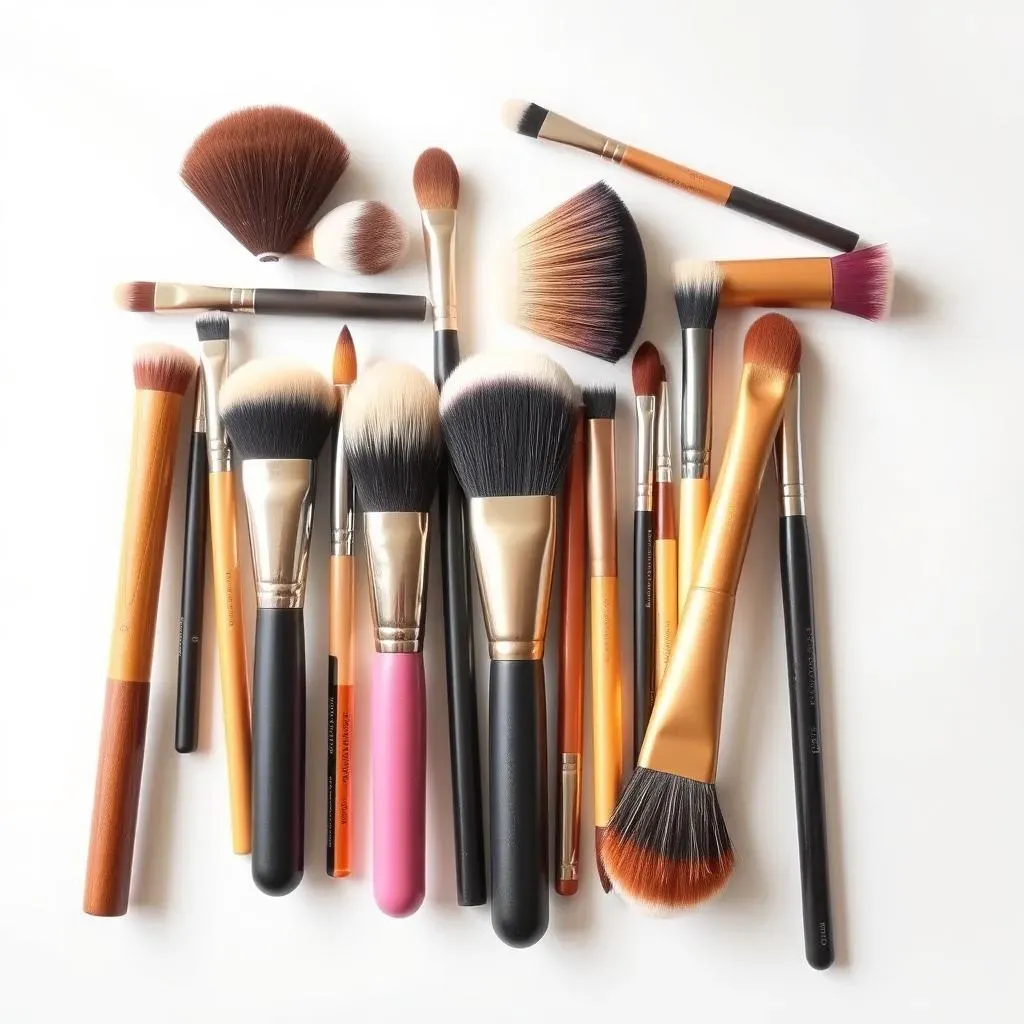Table of Contents
Ever stared at your makeup bag, a jumble of brushes, and wondered what each one does? You're not alone! It's like having a toolbox but not knowing which tool is for what. This guide is here to demystify those fluffy sticks and help you understand the world of makeup brushes. We're going to break down the main types of makeup brush, from the big guys for your face to the tiny ones for your eyes. We’ll explore how each brush is designed to do different jobs, like applying foundation smoothly or creating that perfect smoky eye. It's not about having every brush under the sun, but knowing which ones are the best for the look you're trying to achieve. We’ll also cover a very important step: keeping your brushes clean, because nobody wants to spread bacteria on their face! So, let's get started and learn how these tools can make your makeup routine a whole lot easier and your look a whole lot better.
Face Makeup Brushes: Your Everyday Tools
Face Makeup Brushes: Your Everyday Tools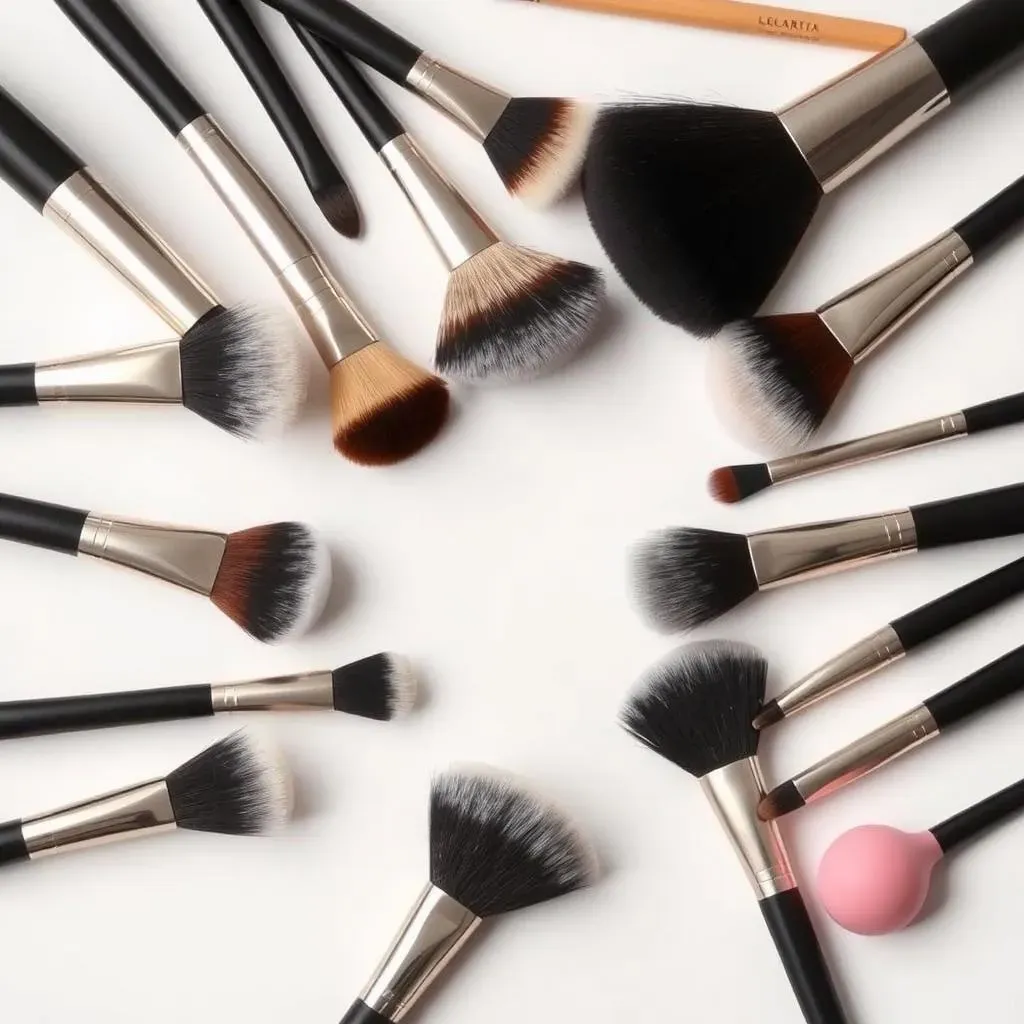
The Foundation Fanatics
Let's talk about foundation brushes, the workhorses of your makeup bag. You’ve got a few options here, and each one gives a slightly different finish. First, there's the classic tapered foundation brush. It's great for liquid foundation because it lets you build coverage. Think of it like painting a wall – you start with a thin coat and add more where you need it. Then, we have the stippling brush, which has two layers of bristles. This one is awesome for a light, airbrushed look. It’s like a soft whisper of makeup on your face, not a heavy layer. Lastly, there is the beauty blender – it's not technically a brush, but I would be remiss if I didn't mention it. This sponge gives an amazing flawless finish and works well with cream and liquid foundation.
It’s all about experimenting to see what works best for your skin and the type of coverage you want.
Powder Powerhouses
Next up, let's chat about powder brushes. These are your go-to for setting your makeup and keeping that shine at bay. A big, fluffy powder brush is your best friend for applying loose or pressed powder all over your face. It's like a soft cloud gently dusting your skin. Then there's the angled contour brush. This one is specifically designed to help you sculpt your face, creating shadows and highlights to add definition. Think of it as your secret weapon for cheekbones that could cut glass. And don't forget the blush brush. It’s usually a bit smaller than a powder brush, and it's designed to put color on the apples of your cheeks, giving you that healthy, rosy glow.
These brushes are all about precision and giving your face dimension.
The Multi-taskers
Finally, let's talk about the multi-taskers, the brushes that can do a bit of everything. The Kabuki brush is a short, dense brush that can be used for powder, blush, or even foundation. It's like the Swiss Army knife of the makeup brush world. The fan brush is another one that’s good for multiple jobs. It’s great for applying highlighter, but also for dusting away excess powder or eyeshadow fallout. It’s like a gentle breeze that can tidy up your face. And lastly, the silicone blender. This is a non-porous, easy-to-clean option for applying foundation, concealer or even skincare. It’s a great choice if you want to minimize product waste and maintain hygiene.
These multi-taskers are great to have when you're traveling or want to keep your makeup bag simple.
Brush Type | Use | Best For |
|---|---|---|
Tapered Foundation Brush | Applying liquid foundation | Buildable coverage |
Stippling Brush | Applying liquid or cream foundation | Light, airbrushed finish |
Beauty Blender | Applying liquid or cream foundation | Flawless finish |
Powder Brush | Applying loose or pressed powder | Setting makeup, reducing shine |
Angled Contour Brush | Applying contour powder | Sculpting face |
Blush Brush | Applying blush | Adding color to cheeks |
Kabuki Brush | Powder, blush, foundation | All-in-one application |
Fan Brush | Highlighter, dusting powder | Adding glow, tidying up |
Silicone Blender | Applying liquid or cream foundation | Minimal product waste, hygiene |
Eye Makeup Brushes: Creating the Perfect Look
Eye Makeup Brushes: Creating the Perfect Look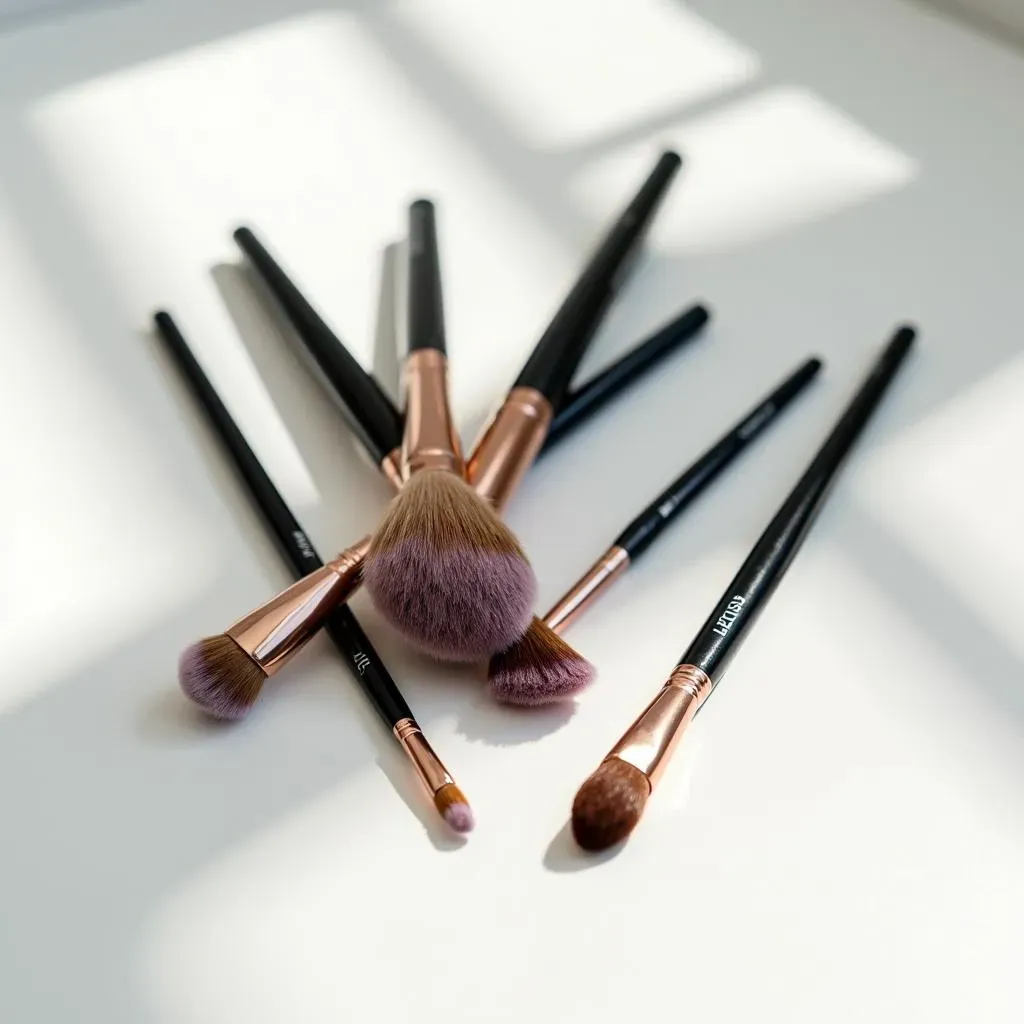
The Essential Eye Shadow Brushes
Alright, let's move on to the eye area, where things get a little more detailed. Eye shadow brushes are key for creating all sorts of looks, from a simple wash of color to a dramatic smoky eye. The most common type is the angled eye shadow brush. It's great for packing color onto your lid and can be used to create defined lines. Think of it as your go-to for applying a base color. Then there’s the eye shadow crease brush. This one has a tapered tip that fits perfectly into the crease of your eye. It’s like your secret weapon for adding depth and dimension to your eye look. And don't forget the blending brush. It's usually a fluffy, dome-shaped brush that is essential for softening harsh lines and creating a seamless transition between colors. It's like a magic eraser for your eyeshadow.
These brushes are all about precision and blending, creating a look that is both defined and soft.
Lining and Defining
Now, let’s talk about brushes for lining and defining. The eyeliner brush is super thin and precise. It allows you to create sharp lines along your lash line, whether you're using a liquid, gel, or cream eyeliner. It's like a tiny paintbrush for your eyes. Then there’s the brow brush. It’s usually an angled brush that’s designed to fill in your eyebrows with powder or pomade. Think of it as your tool for creating perfectly shaped brows that frame your face. And lastly, the mascara wand. This might come with your mascara, but you can also buy disposable ones to help separate and define your lashes. It’s like a tiny comb for your eyelashes.
These brushes are all about adding definition and polish to your eye look.
Brush Type | Use | Best For |
|---|---|---|
Angled Eye Shadow Brush | Packing on color | Base color application |
Eye Shadow Crease Brush | Adding depth to the crease | Creating dimension |
Blending Brush | Blending eyeshadow | Softening lines |
Eyeliner Brush | Applying eyeliner | Creating sharp lines |
Brow Brush | Filling in eyebrows | Defining brows |
Mascara Wand | Separating lashes | Defining lashes |
Specialty Makeup Brushes: When You Need a Little Extra
Specialty Makeup Brushes: When You Need a Little Extra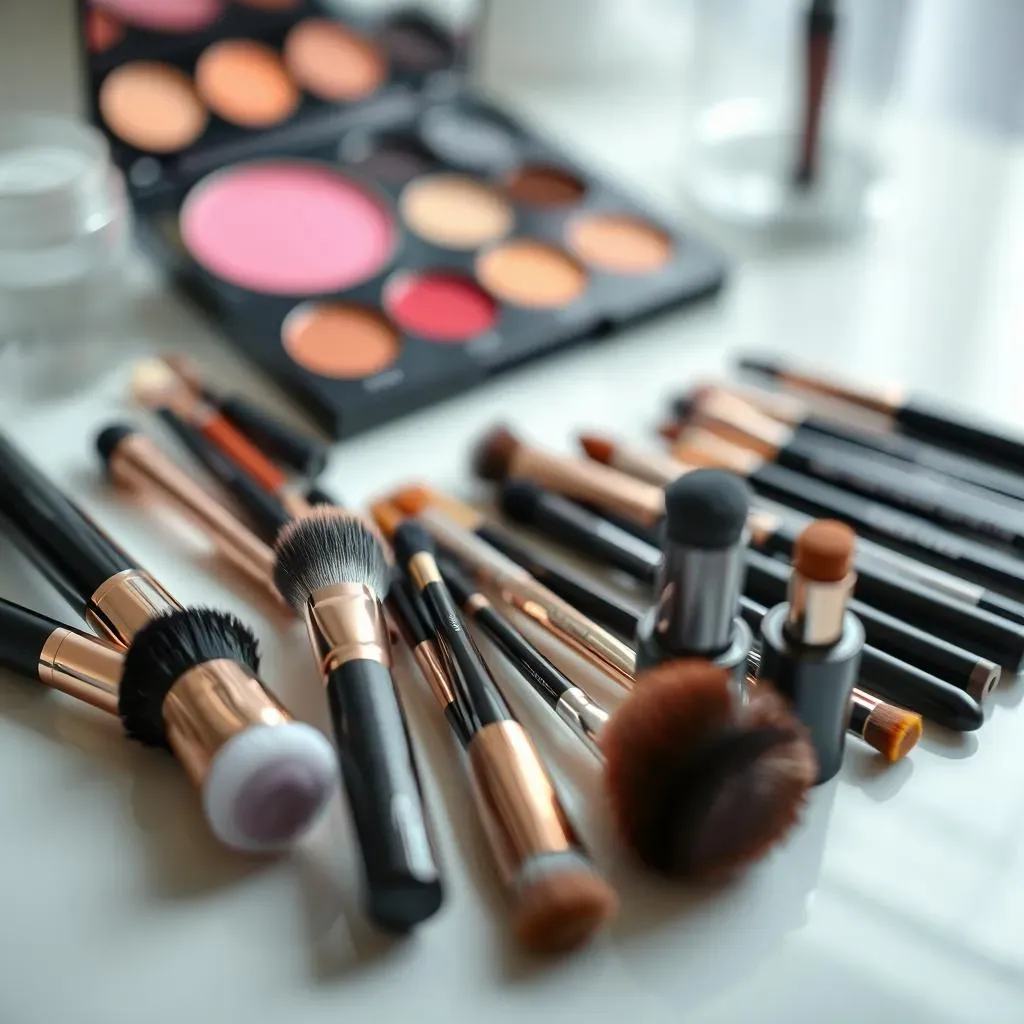
Lip Brushes: Perfecting Your Pout
Okay, so you've got your face and eyes covered, but what about your lips? This is where specialty brushes come in. A lip brush is a small, thin brush with a pointed tip, designed to apply lipstick or lip gloss with precision. Think of it like a tiny paint brush for your lips – it lets you create sharp lines and fill in color evenly. It's especially useful for those bold colors that need a steady hand. Then there’s the lip liner brush. This one is even thinner and more precise, designed to apply lip liner to define the shape of your lips. It's like drawing a perfect outline for your masterpiece. These brushes might seem small, but they make a huge difference in creating a polished lip look.
They’re all about control and adding that extra level of detail.
Other Unique Brushes
Now, let's talk about some other unique brushes that might not be in everyone's makeup bag but can be incredibly helpful. There's the concealer brush. This one is usually small and flat, perfect for applying concealer to small areas like under your eyes or around blemishes. It’s like a tiny spatula for your face, covering up any imperfections. Then there’s the spoolie brush, which is similar to a mascara wand but without the mascara. It's great for grooming your eyebrows and separating your lashes. Think of it as a tiny comb for your face. And lastly, there’s the detail brush. This is a tiny, pointed brush that's perfect for applying highlighter to small areas or adding intricate details to your eye look. It’s like a fine-tipped pen for your makeup.
These brushes are all about making those small but significant touches that elevate your overall look.
Brush Type | Use | Best For |
|---|---|---|
Lip Brush | Applying lipstick or gloss | Precision application |
Lip Liner Brush | Applying lip liner | Defining lip shape |
Concealer Brush | Applying concealer | Covering small areas |
Spoolie Brush | Grooming eyebrows and lashes | Separating and defining |
Detail Brush | Highlighting small areas | Adding intricate details |
Keeping Your Makeup Brushes Clean: Why It Matters
Keeping Your Makeup Brushes Clean: Why It Matters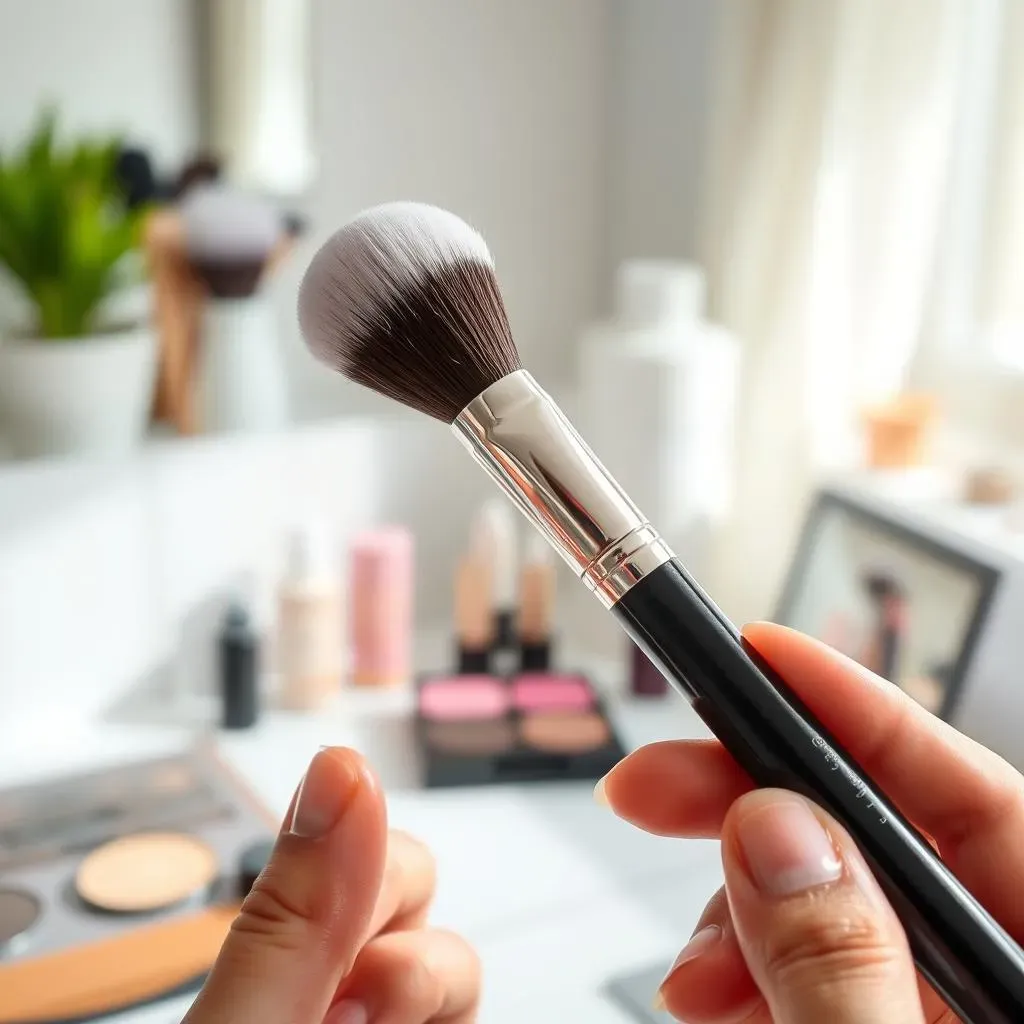
Alright, let's talk about the not-so-glamorous but super important part of makeup: cleaning your brushes. Think of your makeup brushes like your toothbrush – you wouldn't use a dirty toothbrush, right? Well, the same goes for your makeup brushes. When you use them, they pick up all sorts of stuff – makeup, oils, dead skin cells, and even bacteria. Yuck! If you don't clean them regularly, you're just transferring all that gunk back onto your face every time you do your makeup. This can lead to breakouts, skin irritation, and even infections. No one wants that, so keeping your brushes clean is a must for healthy skin.
So how often should you be cleaning your brushes? Well, if you use them daily, try to wash them at least once a week. If you use them less often, then once every other week should be fine. You can use a gentle soap or a special brush cleanser. Just wet the bristles, add a bit of soap, and gently swirl them around in your hand. Then, rinse them thoroughly until the water runs clear. Make sure to squeeze out any excess water and lay them flat to dry. Avoid standing them up to dry because the water can seep into the base and loosen the glue. It’s a little bit of effort, but your skin will thank you for it. Plus, clean brushes apply makeup so much better! It’s like giving your makeup tools a spa day.
Cleaning Frequency | Use |
|---|---|
Daily Use | Once a week |
Less Often | Once every other week |
Cleaning your brushes not only keeps your skin healthy but also helps your brushes last longer. Think of it as maintenance for your tools. Just like a car needs regular oil changes, your brushes need regular cleaning. If you don’t clean them, the bristles can get clogged with makeup, making them stiff and less effective. Not only that, but clean brushes apply makeup much more smoothly and evenly. Nobody wants a streaky foundation or patchy eyeshadow! So, make it a habit to clean your brushes regularly. It’s a small step that makes a big difference in both your makeup application and your skin health. Think of it as a way to show your brushes some love, and they'll show you some love back.
